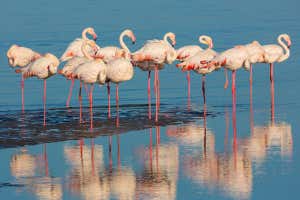[ad_1]

Inge Johnsson/Alamy
They might be notable for their pink feathers and long necks, but it is the question of why flamingos stand on one leg that has kept scientists guessing. The answer might be threefold: because it’s easier, warmer and less abrasive. Studies show that flamingos are significantly more likely to stand on one leg in bodies of water than on land, suggesting they do so to conserve heat. Some flamingos also live in very salty or alkaline lakes leading to the suggestion that they may stand on one leg at a time to prevent over exposure or burns. It may also take less energy for a flamingo to stand on one leg than two, thanks to their ability to passively support their body weight.
NFTs sell for millions of dollars

OreoImages / Alamy
NFT stands for non-fungible token. In the digital world the term defines a cryptographic record of ownership for a unique item that is encoded in a blockchain. Like the deeds to a house, NFTs show who owns something, but they are not the same as the item itself. As a result, NFTs can be used to sell multiples of the same item, an artwork or album, for instance. In October 2020 Artist Mike Winkelmann, aka Beeple sold a piece of digital artwork as an NFT for $66,666.66. That piece sold four months later for $6.6 million.
Advertisement
Protein can be grown on trees

Human protein produced by a leaf.
JAMES KING-HOLMES/SCIENCE PHOTO
Well, strictly speaking, on plants, but the principle remains the same. Molecular farming allows us to grow protein using plant cells instead of animal ones. Rather than growing them within a chicken’s egg, as we do for flu vaccines, molecular farming allows us to genetically modify plants so that their cells become “factories” for protein, producing harvestable quantities in their leaves. Once grown, we can then extract the goods in a faster, more cost-effective way. This could then benefit rural farming communities who would be able to grow crops that yield far more profit than, say, vegetables.
More on these topics:
[ad_2]
Source link




